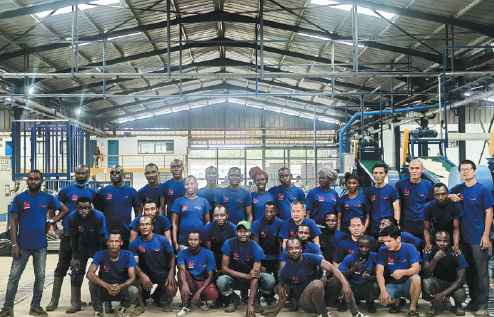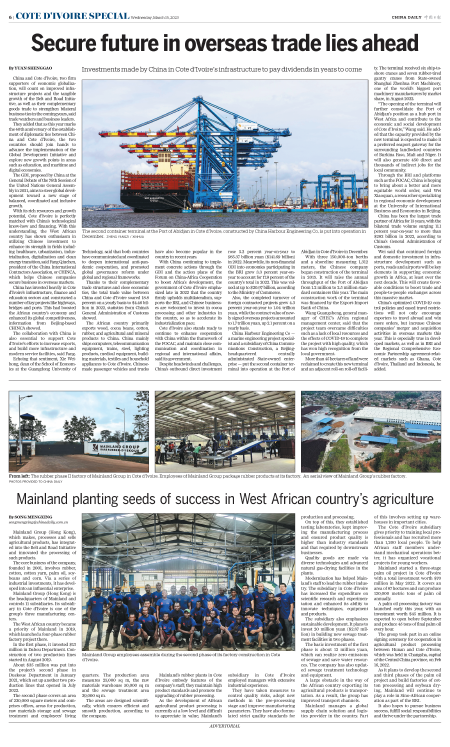
From left: The rubber phase II factory of Mainland Group in Cote d'Ivoire. Employees of Mainland Group package rubber products at its factory. An aerial view of Mainland Group's rubber factory.

Mainland Group employees assemble during the second phase of its factory construction in Cote d'Ivoire.
Mainland Group (Hong Kong), which makes, processes and sells agricultural products, has integrated into the Belt and Road Initiative and innovated the processing of such products.
The core business of the company, founded in 2001, involves rubber, cotton, cotton yarn, palm oil, soybeans and corn. Via a series of industrial investments, it has developed into an influential enterprise.
Mainland Group (Hong Kong) is the headquarters of Mainland and controls 11 subsidiaries. Its subsidiary in Cote d'Ivoire is one of the group's three manufacturing centers.
The West African country became a priority of Mainland in 2019, which launched a four-phase rubber factory project there.
In the first phase, it invested $13 million in Dabou Department. Construction of two production lines started in August 2019.
About $35 million was put into the project's second phase in Duekoue Department in January 2021, which set up another two production lines that opened in July 2022.
The second phase covers an area of 220,000 square meters and comprises offices, areas for production, raw materials storage and sewage treatment and employees' living quarters. The production area measures 25,000 sq m, the raw materials warehouse 50,000 sq m and the sewage treatment area 29,000 sq m.
The areas are designed scientifically, which ensures efficient and smooth production, according to the company.
Mainland's rubber plants in Cote d'Ivoire embody features of the company's staff; they maintain high product standards and promote the upgrading of rubber processing.
As the development of African agricultural product processing is currently at a low level and difficult to appreciate in value, Mainland's subsidiary in Cote d'Ivoire employed managers with extensive industrial experience.
They have taken measures to control quality risks, adopt new methods in the pre-processing stage and improve manufacturing parameters. They have also formulated strict quality standards for production and processing.
On top of this, they established testing laboratories, kept improving the manufacturing process and ensured product quality is higher than industry standards and that required by downstream businesses.
Quality goods are made via diverse technologies and advanced natural gas-drying facilities in the plants.
Modernization has helped Mainland's staff to lead the rubber industry. The subsidiary in Cote d'Ivoire has increased the expenditure on scientific research and experimentation and enhanced its ability to innovate techniques, equipment and products.
The subsidiary also emphasizes sustainable development. It plans to invest 20 million yuan ($2.87 million) in building new sewage treatment facilities in two phases.
The basic investment of the first phase is about 12 million yuan, which can realize zero emissions of sewage and save water resources. The company has also updated sewage treatment technology and equipment.
A large obstacle in the way of the African country exporting its agricultural products is transportation. As a result, the group has improved transport channels.
Mainland manages a global supply chain solution and logistics provider in the country. Part of this involves setting up warehouses in important cities.
The Cote d'Ivoire subsidiary gives priority to training local professionals and has recruited more than 1,200 local people. To help African staff members understand mechanical operations better, it has organized vocational projects for young workers.
Mainland started a three-stage palm oil project in Cote d'Ivoire with a total investment worth $70 million in May 2022. It covers an area of 87 hectares and can produce 120,000 metric tons of palm oil annually.
A palm oil processing factory was launched early this year, with an investment worth $45 million. It is expected to open before September and produce 45 tons of final palm oil every hour.
The group took part in an online signing ceremony for cooperation in agricultural product processing between Hunan and Cote d'Ivoire, which was held in Changsha, capital of the Central China province, on Feb 16, 2022.
As it plans to develop the second and third phases of the palm oil project and build factories of cotton processing and soybean drying, Mainland will continue to play a role in Sino-African cooperation as part of the BRI.
It also hopes to pursue business success, fulfill social responsibilities and thrive under the partnership.
songmengxing@chinadaily.com.cn

